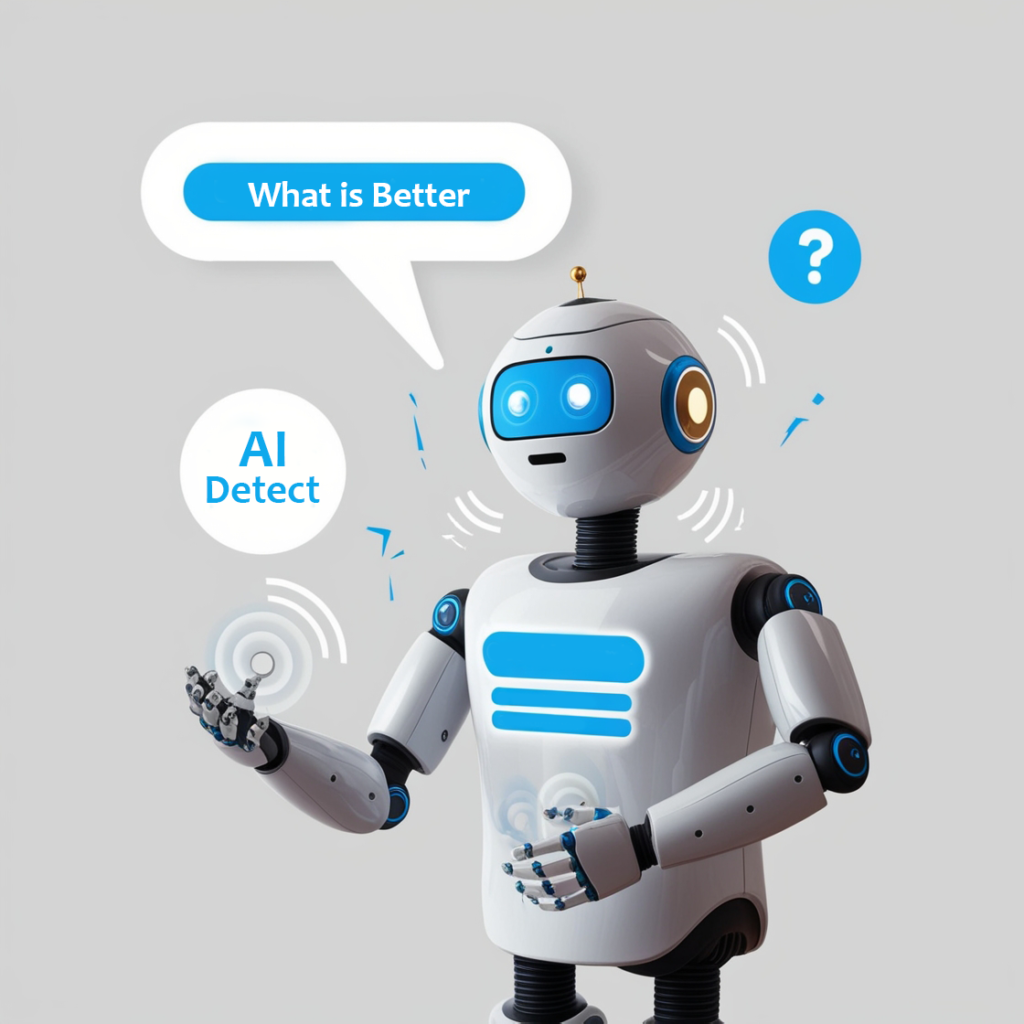
Alternatives for TraceGPT
TraceGPT has become one of the most powerful AI plagiarism checkers and content detectors on the market, trusted by students, educators, and content creators alike. Known for its accuracy in detecting text from AI tools like ChatGPT, Claude, Gemini, and more, it’s a go-to for anyone looking to ensure their content is original and authentic.

But what if you’re looking for other options that offer similar features—or maybe something a little different to fit your specific needs? In this post, we’ll explore the best alternatives to TraceGPT, helping you find the right tool to maintain content integrity, avoid AI-assisted plagiarism, and keep your writing genuinely your own.
If you’re exploring alternatives to TraceGPT, it’s important to know what features matter most. Not every AI detector is created equal, and the right one for you depends on your specific needs—whether you’re a student, teacher, blogger, or digital marketer.
Here are key things to look for when choosing a TraceGPT alternative
1. Accuracy of AI Detection
The top priority is how well the tool detects AI-generated content from models like ChatGPT, Claude, Gemini, and others. A good alternative should offer precise and detailed analysis that can tell the difference between human and AI writing—even in complex or well-edited texts.
2. Speed and Ease of Use
Look for a tool that’s fast and user-friendly. You shouldn’t have to wait minutes for results or go through a complicated setup. A clean interface and quick scanning make your workflow smoother.
3. Detailed Reports and Feedback
The best tools don’t just say “AI or human” — they explain why. Look for alternatives that provide in-depth feedback, confidence scores, and highlighted areas of concern so you can learn and improve your content.
4. Support for Multiple AI Models
AI detection tools should be capable of spotting content from a range of AI models, not just ChatGPT. This includes Claude, Gemini, and other emerging tools. Broader coverage means more reliable detection.
5. Plagiarism Detection
Many AI detectors also include built-in plagiarism checkers. If you need both AI detection and originality checks, choose a tool that combines these features in one platform.
6. Suitable for Your Use Case
Different tools are better for different needs. Some are made for academic use, others for SEO and content marketing. Make sure the tool aligns with your purpose—whether that’s detecting AI in essays, blogs, ads, or student papers.
7. Pricing and Plans
Cost is always a factor. Check if the tool offers a free version, trial period, or affordable monthly plans. Look for value—accurate results and useful features at a fair price.
8. Data Privacy
Make sure the platform protects your data. Whether you’re scanning sensitive academic papers or business content, choose a tool that doesn’t store or misuse your text.
By focusing on these factors, you’ll be able to find a TraceGPT alternative that fits your workflow, maintains content integrity, and helps you stay ahead in a world filled with AI-generated writing.
Best Alternatives to TraceGPT
Looking for a TraceGPT alternative that fits your needs? Here are some of the most reliable AI detection tools on the market. Each tool has its own strengths, whether you’re focused on academic integrity, SEO content, or general AI detection. Let’s break them down:
Originality.AI
Key Features
- Detects AI content from ChatGPT, GPT-4, Claude, Gemini, and more
- Built-in plagiarism checker
- Content scoring with detailed reports
- Team collaboration support
- Chrome extension available
Pros
- High accuracy for both AI and plagiarism detection
- Tailored for content marketers and web publishers
- Easy-to-read content scoring with confidence level
- Frequent updates to detect latest AI models
Cons
- Paid-only (no free version)
- UI may feel too technical for casual users
GPTZero
Key Features
- Simple interface to detect AI-generated text
- Focused on educational use
- Supports batch file uploads for teachers
- Highlighted AI text sections
Pros
- Great for educators and students
- Quick results with confidence indicators
- Free version available
Cons
- Less effective on heavily edited AI content
- Limited features for marketers or agencies
ZeroGPT
Key Features
- Detects AI text from ChatGPT, Bard, and other models
- Sentence-by-sentence analysis
- Bulk text detection supported
- Offers multilingual support
Pros
- User-friendly dashboard
- Multi-language detection
- Offers both AI and human probability scoring
Cons
- Accuracy drops with rewritten content
- Lacks plagiarism check
🔗 Visit ZeroGPT
Turnitin (AI Detection)
Key Features
- Integrated into academic workflow
- Detects AI-assisted writing and text modifications
- Used by schools and universities worldwide
Pros
- Trusted name in academic integrity
- Seamless LMS integration
- Includes plagiarism detection
Cons
- Not accessible to individuals (institution-only)
- Expensive and enterprise-focused
Content at Scale – AI Content Detector
Key Features
- Real-time AI content scanning
- Designed for content marketers
- Detects GPT-3, GPT-4, Claude, Bard, and more
- Simple copy-paste interface
Pros
- Fast and free detection tool
- No account required
- Built for SEO and content creation
Cons
- Basic UI, limited detail in results
- Doesn’t offer plagiarism detection
🔗 Visit Content at Scale Detector
Which Alternative Is Best for You?

Finding the right TraceGPT alternative depends on who you are and how you use AI detection tools. Here’s a breakdown of the best options for different user types:
For Educators & Students
If you’re a teacher, professor, or student, accuracy and academic trust matter most. You want tools that highlight AI use, support essay-level analysis, and maintain academic integrity.
✅ Best Pick: GPTZero
- Designed for education
- Highlights AI-written sections in student papers
- Free version available
- Trusted by schools and universities
✅ Also Consider: Turnitin
- Enterprise-grade academic tool
- Integrates with learning management systems (LMS)
- Ideal for institutional use
For Business & Marketing Teams
Marketers and agencies need to protect their brand, ensure originality, and avoid SEO penalties from AI-heavy content.
✅ Best Pick: Originality.AI
- Combines AI detection + plagiarism check
- Bulk scanning, team access, Chrome extension
- Ideal for managing multiple writers or campaigns
✅ Also Consider: Content at Scale Detector
- Simple, no-login tool
- Quick checks for campaign copy, landing pages
- Tailored for content marketers
For Content Writers & Bloggers
Writers want tools that help keep their work authentic while ensuring they don’t accidentally copy AI or other sources.
✅ Best Pick: ZeroGPT
- Supports multiple languages
- Offers detailed human vs AI probability
- Good for freelance writers across regions
✅ Also Consider: GPTZero
- Clear results and easy interface
- Useful for proofreading and editing
For SEO Professionals
Search engines value original content, human-written content. SEO experts need detection tools that keep content unique and ranking well.
✅ Best Pick: Originality.AI
- Designed for SEOs and publishers
- API access for integration
- High accuracy to avoid AI-triggered penalties
✅ Also Consider: Content at Scale Detector
- Made by SEO pros for SEO pros
- Quick, surface-level check before publishing
Quick Tips for Choosing the Right AI Detector
Not sure which AI detection tool fits your needs? Here are some quick tips to help you pick the best alternative to TraceGPT based on your goals, content type, and workflow:
Know Your Purpose
Start by asking: Why do I need an AI detector?
- For education → Choose tools like GPTZero or Turnitin for essay analysis and academic reliability.
- For SEO and publishing → Go for Originality.AI or Content at Scale for deeper scans and SEO-friendly results.
- For general blogging or freelance work → Use accessible tools like ZeroGPT or Quetext.
Check Detection Accuracy
Look for tools that provide detailed analysis, such as:
- Human vs AI probability scores
- Highlighted AI-generated text
- Confidence levels or sentence-level insights
Tools like Originality.AI and TraceGPT excel in precision.
Consider Workflow Compatibility
Choose a tool that fits your workflow:
- Chrome extensions for quick checks while browsing
- Team access for managing multiple writers
- API support for automation
Great for businesses and agencies using tools like Originality.AI.
Look for Extra Features
A solid AI detector often includes:
- Plagiarism detection
- Multi-language support
- Reporting tools
- Real-time scanning
If you want more than just AI detection, go for tools like Scribbr or Copyscape.
Balance Price and Features
Free tools like ZeroGPT and GPTZero are great for occasional use.
For heavy-duty needs, paid tools offer better accuracy, scalability, and support.
Final Tip: Test Before You Commit
Most tools offer free trials or limited scans—try a few to see which one fits best!
Choosing the right AI detection tool isn’t just about features—it’s about finding the one that aligns with your content goals, accuracy needs, and daily workflow.
Final Thoughts: Is TraceGPT Still the Best?
TraceGPT has earned its spot as one of the most advanced AI content detectors out there. With its powerful ability to scan content created by tools like ChatGPT, Claude, Gemini, and others, it remains a top choice for many users who prioritize accuracy, reliability, and ease of use.
But is it always the best option?
When TraceGPT Still Shines:
- You need high detection accuracy across multiple AI models
- You want fast, easy-to-understand reports
- You’re focused on academic integrity, content originality, or SEO trustworthiness
- You work in an environment where mislabeling AI content can have serious consequences
In these cases, TraceGPT is still a leading tool—trusted by educators, marketers, writers, and businesses alike.
When to Explore Alternatives:
- You need a budget-friendly or free tool for light usage
- You want a detector with built-in plagiarism checkers or multi-language support
- You’re looking for features like team management, Chrome extensions, or content scoring
- Your content needs are more SEO-specific or focus on blog publishing workflows
In such cases, alternatives like Originality.AI, GPTZero, or ZeroGPT might offer more tailored solutions.
Bottom Line:
TraceGPT is still one of the best in the game—but that doesn’t mean it’s the only game in town.
Depending on your goals, workflow, and budget, exploring a few alternatives might give you the perfect mix of performance, flexibility, and value.
Whatever you choose, the key is to use AI detection wisely—to protect originality, uphold integrity, and ensure trust in every piece of content you publish.
FAQ: TraceGPT Alternatives
Q1: Is TraceGPT better than GPTZero?
A: It depends on your needs. TraceGPT is known for its high accuracy, especially with detecting content from tools like ChatGPT, Claude, and Gemini. GPTZero is also a strong option, widely used in education for spotting AI-generated essays. If you’re an educator or content creator needing deeper analysis and cross-AI detection, TraceGPT might be the better pick.
Q2: Are free AI detection tools reliable?
A: Some free tools do a decent job, especially for basic checks. However, free AI detectors often lack the precision and advanced algorithms of premium options like TraceGPT or Originality.AI. For critical use cases—like academic work, business content, or SEO—paid tools offer more dependable results.
Q3: Can AI detectors catch rewritten AI content?
A: AI detectors are getting smarter, but rewritten or heavily edited AI content can sometimes pass through undetected. Tools like TraceGPT use linguistic pattern analysis and AI behavior models to increase detection accuracy, but no tool is 100% foolproof. That’s why combining AI detection with human review is still best practice
Q4: What’s the best AI plagiarism checker for students?
A: For students, TraceGPT and GPTZero are both strong choices. GPTZero is popular in schools for its user-friendly interface and educator-focused features, while TraceGPT offers high-level accuracy and supports content detection from multiple AI models. Turnitin is also widely used in academic institutions for checking both AI and traditional plagiarism.
Need more help picking the right tool? Check out our Quick Tips section for guidance on choosing the best AI detector based on your goals!
